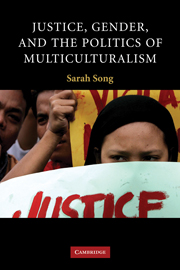6 - Polygamy in America
Published online by Cambridge University Press: 22 September 2009
Summary
The two preceding chapters illustrate an intercultural dynamic that discussions of multiculturalism must acknowledge: patriarchal practices in minority groups are sometimes accommodated because they are shaped by and congruent with the patriarchal norms of the majority culture. This chapter aims to highlight a different and more subtle intercultural dynamic: how critique of minority norms and practices, even by well-intentioned reformers, can divert attention from the majority culture's own inequalities, shielding them from criticism and perhaps even fueling discourses of cultural superiority within the dominant culture. Such a diversionary effect can be seen in the controversy over Mormon polygamy in nineteenth-century America, as well as in contemporary debates over minority cultural practices, including arranged marriage and female circumcision within immigrant communities.
The movement against Mormon polygamy provides an early example of a minority group's demand for accommodation – in this case, a demand for immunity from prosecution, an exemption – and the dominant culture's overwhelmingly negative response. As one legal historian put it, the federal government pursued the campaign against polygamy with “a zeal and concentration” that was “unequalled in the annals of federal law enforcement.” Opponents of polygamy called for federal intervention to dismantle what was widely considered a deeply patriarchal practice. Some might look approvingly at the outcome of this case, pointing to it as a model for how liberal democratic states might deal with illiberal and nondemocratic groups.
- Type
- Chapter
- Information
- Justice, Gender, and the Politics of Multiculturalism , pp. 142 - 168Publisher: Cambridge University PressPrint publication year: 2007

